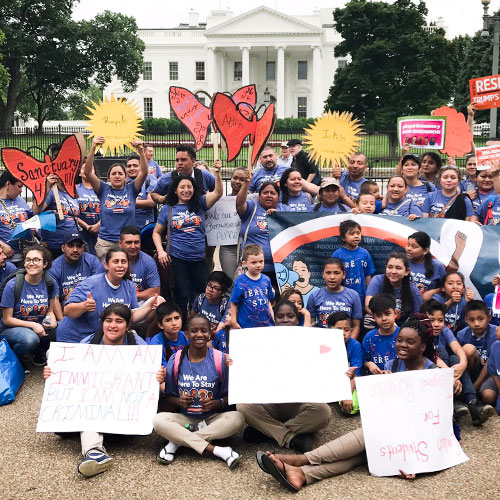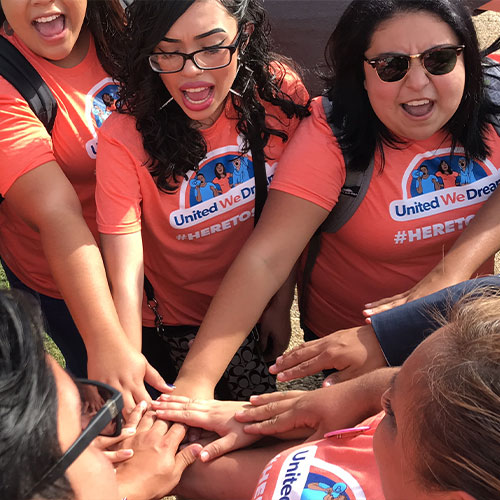Scenarios
What is SB1718?
Leer en Español.
SB1718 is an anti-immigrant bill that takes away local government funding for community IDs, forcing hospitals to inquire about patients’ immigration status, and criminalizing undocumented immigrants for traveling in and out of the state. SB1718 sets a precedent by putting immigrants across the country at risk of becoming the target of similar legislation in their own home states.
Directly Impacted
Know Your Power and fight back against SB1718. Stay up to date to receive our latest Know Your Rights materials and updates on what this new law means for you, sign up here. We have rights regardless of our immigration status, these are our constitutional rights:
- The right to remain silent.
- The right to an attorney.
- If you are arrested by local law enforcement, you have the right to an attorney provided by the government.
- If you are detained by Immigration Enforcement, you have the right to consult an attorney but they are not obligated to provide one.
- The right to deny search without a warrant.
Being Prepared is key! Have a safety plan!
- Have a plan with your loved ones and assign different roles:
- Who is the person that will support your case?
- Have a folder name it “Privileged and confidential” and assign a trusted loved one
- Who will be the person responsible for your children?
- Identify a trusted immigration attorney to see what options you might have, and have a plan in case of being detained by Immigration Enforcement.
- Have at least one phone number memorized.
- If you have a pending immigration case, have copies of your process with you.
- Preparing is also using technology, linking videos, and photos to your cloud, avoiding facial recognition features & fingerprints on your mobile device.
Driving within the state of Florida:
- Be prepared
- Before driving make sure to do a walkthrough of your vehicle and do a general inspection checking for any reasons an enforcement officer might stop someone for a minor infraction.
- Ex. Tail lights, turn signals, tags
- Local Community ID’s are still a valid form of identification
- Before driving make sure to do a walkthrough of your vehicle and do a general inspection checking for any reasons an enforcement officer might stop someone for a minor infraction.
- If a stop by local law enforcement happens:
- You might be required to identify yourself.
- You have Right to remain silent – Giving false information can have a negative impact on your case. Don’t give information about your immigration status.
- If an arrest happens by local law enforcement, you have the right to an attorney provided by the government.
- If detention happens from Immigration enforcement, you have the right to consult an attorney.
- Don’t Sign anything without an attorney present.
Driving to Florida from out of state:
- Prepare yourself
- Check your travel route prior to traveling through state lines.
- Check for checkpoints, we have the 100 mile border zone which means you can encounter enforcement within this zone. https://www.aclu.org/know-your-rights/border-zone
- Make sure loved ones are aware you are traveling and remind them of their roles on your safety plan.
- If a stop does happens Remember that you have rights:
- You might be required to identify yourself.
- You have Right to remain silent – Giving false information can have a negative impact on your case. Don’t give information about your immigration status.
- You do not have to answer any questions related to your immigration status.
- You have the right to an attorney.
- Don’t Sign anything.
Traveling also involves airports!
- Prepare yourself:
- Airports are a port of entry and enforcement can be present including CBP & TSA.
- TSA can appear to be “friendly” on occasions, be prepared to not engage with additional questions; they are still part of immigration enforcement. .
- If you are undocumented and have a valid form of ID to travel, Don’t carry any additional information of your immigration status.
- Get your or on your smart devices ready. Make sure you disable facial recognition, and fingerprints.
- If you are being questioned, remember your rights:
- Don’t share any information about your loved ones.
- Don’t disclose any of your immigration status information.
- Ask am I being detained? If yes, exercise your rights
- Right to Remain Silent
- Ask for your right to consult an attorney, and
- Do not sign or agree to anything without an attorney present.
- If the answer is “No”, ask am I free to go?
In a public space:
- Prepare yourself
- Share your location with a trusted one.
- Community ID’s are still a valid form of identification
- Do not carry foreign ID documentation (Passports, Consular IDs etc)
- If approached by enforcement, remember your rights.
- You have the right to not answer any questions about your immigration status.
- Ask these important questions:
- Am I being detained?
- If the answer is, Yes, Remember to exercise your rights.
- Remain silence
- Right to an attorney
- No search without probable cause
- Do not sign anything
- If the answer is, No, Simply follow by:
- Am I free to go?
- Walk away slowly.
- If the answer is, Yes, Remember to exercise your rights.
- Am I being detained?
In a Hospital:
- Prepare yourself
- SB1718 contradicts the national guidance for sensitive locations, which includes Medical Treatment & Healthcare Facilities. We must be ready to document where people are being detained or denied healthcare services due to policies like SB 1718.
- Have a loved one or a trusted person with you if possible for better documentation.
- You have rights
- You have the right to be treated with respect
- If they ask about immigration status, you have the right to deny this information.
- You have the right to keep your medical records private.
- If Immigration Enforcement is in the hospital, remember to exercise your rights.
At home:
- Prepare yourself:
- Remain calm.
- Have a safety plan.
- Create a neighborhood group to keep a look out for any unmarked vehicles.
- Remember Your Rights!
- Do not open the door. If you open the door you have less control and it can escalate the situation.
- If agents want to come inside, ask for a warrant and verify that it is signed by a judge!!!
- Do it in a safe way, ask for it to be slid under the door, or show it through the window.
- Check that all information is accurate (spelling of your name, address)
- Take photos of the document.
- If the agents forcefully enter the home do not intervene, document or ask someone to document the event.
- Verbally deny consent of a search, exercise your rights
- The right to remain silent
- The right to consult an attorney.
- Do not sign or agree to anything without your attorney present.
- Why does ICE know about our homes?
- Previous Interaction with Immigration Enforcement
- Interaction with Local Law Enforcement
- Tactics used by ICE
- Unmarked vehicles
- Civilian Clothing
- Intimidation
- ICE & CBP tend to lie to get information
- Agents are starting to approach people once they step outside their homes.
At work:
- Prepare yourself and your coworkers:
- Inform your employer and allies in ways they are able to support like asking for a 1-9 audit from officers, and if they don’t have one to ask them to exit the workplace and come back in 2 days, this will allow for employees and employers to plan.
- Prepare a plan with your co-workers/employer in case immigration comes to your work. https://www.uscis.gov/i-9
- Know Your Rights!
- If Immigration Enforcement shows up to your workplace, it’s important to follow your plan.
- Do not run, this will alert them.
- Record the situation without interfering, or ask someone else to do it.
- You can verbally exercise your rights:
- The right to remain silent and to not answer any questions about your immigration status.
- The right to consult an attorney.
- Do not agree or sign anything without your attorney present.
In detention:
- Prepare yourself and your loved ones:
- Inside detention you might be pressured to answer questions, it is important to remain grounded on your rights and to be aware that anything you share can be used against you.
- Be sure to have at least two phone numbers memorized of your loved ones or trusted person that will act incase of a detention, make sure you speak with them and create a plan ahead of time.
- Identify a trusted attorney.
- Know Your Rights!
- You have the right to remain silent, anything you say can be used against you, do not lie or give false information.
- You have the right to seek counsel from an attorney, they are not required to provide one for you.
- Do not sing anything without an attorney present!
- And keep track of any abuse inside detention.
Measure your own risks:
We are aware that often the rights of people are violated, it’s important to remember that you have the power over your own safety, how much you will challenge, how you choose to respond, and how much you are willing to share.
Allies
What can you do as an Ally?
- In the past it has been a collective power that challenged and won against policies like SB1718, and this time around it won’t be different. Together we can fight back and stand in solidarity with directly impacted community members.
- Public Space:
- Remind directly impacted folks what are their rights.
- Record the situations where agencies are present without interfering, focus on the agencies not the person.
- Organize your community to also be part of a community protection group or create one.
- Driving:
- SB1718 is a policy that opens the door to racial profiling.
- If you are driving a loved one for court/ pending cases make sure they are carrying copies of their legal processes.
Hospitals- How can Healthcare Providers support?
- Organize within the hospitals/ Healthcare sectors to not comply with SB1718
- Inform healthcare providers how this will only put people in greater risks.
- Have Know Your Rights flyers around the premises
- Remind people what their rights are as patients.
How can Employer be an ally?
- Notify your employees that your business is going through a vernmental I-9 Audit.
- Explain the I-9 audit process and your legal obligations in the process.
- Keep your employees updated on progress
- Provide Know Your rights information to your employees.
- Refer your employees to a legal council, provide resources.
- Request that your I-9 Audit be via mail or outside of your worksite.
- If Immigration Enforcement shows up at your worksite, demand a Judicial warrant..
- Only provide required documentation ( no additional information, access or documentation).
- Record the situation without interfering
- If you have 25 employees or less you are not required to do an E-verify.






